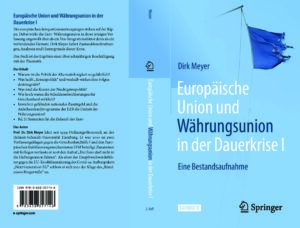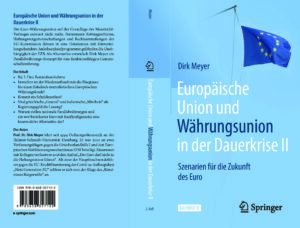Volkswirtschaftslehre, insb. Ordnungsökonomik
Prof. Dr. Dirk Meyer
Helmut-Schmidt-Universität
Universität der Bundeswehr
Gebäude H1, R 2205
Holstenhofweg 85
22043 Hamburg
Tel. (+49) 40 6541 2705
Schuldentragfähigkeit und die neuen Ausnahmen von der Schuldenbremse
Der vorliegende Beitrag analysiert die neu ins Grundgesetz aufgenommenen Ausnahmen von der bisherigen Schuldenregel (Art. 109, 115 und 143h GG) hinsichtlich der Nachhaltigkeit im Sinne der Schuldentragfähigkeit als Bedingung für die langfristige Stabilität der Staatsfinanzen.
Germany’s New Constitutional Rules on Public Debt: An Analysis of Debt Sustainability and Intergenerational Fairness
This article analyzes the new exceptions to the previous debt rule (Articles 109 and 115 of the German Basic Law) with regard to the normative principles of (debt) sustainability and intergenerational fairness. Sustainability requires that the current level of debt be backed by the present value of future primary surpluses, while intergenerational fairness requires that the amount of net borrowing is limited by the amount of net investment (golden rule of investment). We examine and evaluate the defense exception, the special fund (SF) for Infrastructure and Climate Protection as well as the additional deficit leeway for the German states with regard to their justification and design on the basis of these standards. We also take a brief look at possible multiplier effects and inflationary effects. Finally, from an EU perspective, we take a look at the planned European rearmament program ReArm Europe.
Frieden für die Ukraine: Auf den von Russland besetzten ukrainischen Gebieten könnte ein neuer Staat entstehen – oder mehrere
Zentralbankverluste und leistungslose Zinseinkommen für Geschäftsbanken – Ein Vorschlag zur Abschöpfung
Die Notenbanken des Europäischen Systems der Zentralbanken haben durch die Politik der quantitativen Lockerung gewaltige Mengen an Überschussliquidität geschaffen. Diese Überschussliquidität wird von den Geschäftsbanken überwiegend in der sog. Einlagefazilität gehalten, wo sie mit dem Einlagezins verzinst wird. Dies führt zu einem risikofreien Zinseinkommen der Geschäftsbanken, dem keine erkennbare Gegenleistung gegenübersteht. Zugleich belasten die Zinskosten die GuV der nationalen Zentralbanken, sodass absehbar auf Jahre hinaus keine Notenbankgewinne an die nationalen Haushalte abgeführt werden können – vielmehr Verlustausweise wahrscheinlich werden. Wir schlagen vor, die leistungslosen Zinseinkommen der Geschäftsbanken ganz oder teilweise durch geldpolitisch unschädliche steuerliche Maßnahmen abzuschöpfen, um damit entweder Ausgabekürzungen entbehrlich oder Steuerentlastungen möglich zu machen.
Bundesbank-Verluste: Bilanzierungspraxis und etwaige Nachschusspflicht des Bundes
Die Bilanz der Bundesbank und jene anderer Notenbanken des Euroraums weisen aktuell hohe „operative“ Verluste auf, bedingt durch die Diskrepanz aus den weiterhin niedrig verzinsten Wertpapierbeständen aus Anleihekäufen und den mittlerweile höher verzinsten Einlagen der Geschäftsbanken. Indes bildet die aktuelle Bilanzierungspraxis die einhergehenden Wertverluste nicht annähernd marktnah ab. Eine Eigenkapitallücke ist zukünftig nicht ausgeschlossen, was für Notenbanken gemeinhin als unproblematisch gesehen wird. Risiken bestehen jedoch im Kontext einer Rekapitalisierung durch den Staat. Innerhalb des Euroraums könnten nationale und europäische Vorgaben ebensolche Kapitalzuführungen notwendig machen.
Zeitenwende auch für Haushalt und Beschaffungswesen?
in: ifo Schnelldienst, 76. Jg. (2023), H. 7, S. 9-12
Die am 27. Februar 2022 von Bundeskanzler Olaf Scholz beschworene Zeitenwende hat einen so nicht vorhergesehenen großen Wendekreis genommen. Neben haushaltsechtlichen (gesetzlich fixierte Ausgaben, Haushaltsbremse, Vergaberecht) und praktischen Gründen (politischer Widerstand gegen Steuererhöhungen und mögliche Haushaltsumschichtungen) dürften die mit höheren Ausgaben für Verteidigung einhergehenden Verzichtskosten die Ursache sein. Die Kanonen sind entschieden, doch was ist die Butter?
Europäische Union und Währungsunion in der Dauerkrise

„Europäische Union und Währungsunion in der Dauerkrise I – Eine Bestandsaufnahme“, 2., erweiterte Auflage, Springer Fachmedien Wiesbaden, Wiesbaden 2022, Softcover ISBN 978-3-658-35714-6 und eBook ISBN 978-3-658-35715-3, https://doi.org/10.1007/978-3-658-35715-3.

„Europäische Union und Währungsunion in der Dauerkrise II – Szenarien für die Zukunft des Euro“, 2., erweiterte Auflage, Springer Fachmedien Wiesbaden, Wiesbaden 2022, Softcover ISBN 978-3-658-35712-2 und eBook ISBN 978-3-658-35713-9, https://doi.org/10.1007/978-3-658-35713-9.

